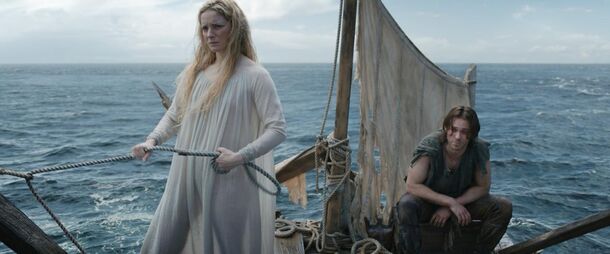Can Rings of Power Avoid Falling into the Marvel-Star Wars Trap?

What if less really is more?
Summary
- The original Lord of the Rings trilogy convinced the world that there was a market for Tolkien adaptations.
- It was followed by the sub-par Hobbit trilogy and now by The Rings of Power.
- The writing team behind this Middle Earth series needs to take a lesson from other major franchises.
In 2001 the world was blessed with The Fellowship of the Ring, an almost-perfect movie that kicked off an almost-perfect trilogy. Thanks to terrific writing, acting, and practical effects, the original Lord of the Rings movies did what should have been impossible: taking a niche series of 500-page fantasy novels and making adaptations that were faithful to the source while still being billion-dollar crowd-pleasers.
Soon followed an adaptation of the children's book (and LoTR prequel) The Hobbit. Unfortunately, while the original Lord of the Rings trilogy was considered a massive gamble (elves and wizards weren't exactly the stuff of blockbusters at the time), the Hobbit movies were mostly considered a massive money-making opportunity.
The short book got dragged out into three overstuffed and unnecessarily long movies, bringing in diminishing box office returns and derision from critics. Nevertheless, Amazon Prime still saw potential in Tolkien's remaining material.
Rings of Copyright
Amazon Prime's The Rings of Power is meant to take place during the events of The Silmarillion, Tolkien's book covering the history and cosmology of Middle Earth. It's a fantastic concept for a show… except for one major problem. Amazon couldn't get the rights to The Silmarillion.
What they did have the rights to was The Lord of the Rings, and those books have hundreds of pages worth of Appendices. Within these pages are many stories from Middle Earth, including some that also appear in The Silmarillion.
So the writers of Rings of Power started writing with one hand tied behind their backs. They wanted to write a show that covered the history of Middle Earth, but they weren't actually allowed to use the history of Middle Earth – except the bits mentioned in LoTR. So they just made a bunch of stuff up.
The result is a messy, overbaked, underwhelming saga that doesn't manage to capture any of the grandeur of Tolkien's world.
Still, it's been years since we've gotten any Tolkien content. So something is better than nothing…isn't it?
Stop It
In a word… no.
Star Wars and Marvel fans have been through this before. Beloved franchises have gotten bogged down because of exactly this attitude from studios: fans are willing to pay for content, so just shove as much at them as possible. Who cares if She-Hulk was a stupid cringe-fest and Obi-Wan Kenobi was a tired mess?
Both Star Wars and Marvel have had some good content in the last few years, of course – but it gets lost in the sea of mediocrity. Andor is regarded as genuinely great, but how many Star Wars fans gave up before ever watching it? (At least one: me.)
So if the world of Tolkien is going to learn one thing from other franchises, it should be this: just because you CAN make something with your intellectual property doesn't mean you SHOULD. Wait until you have a genuinely good idea and hire people who will work tirelessly to bring their passion projects to life.
Anything else is just a cash grab. And fans won't stick around forever.